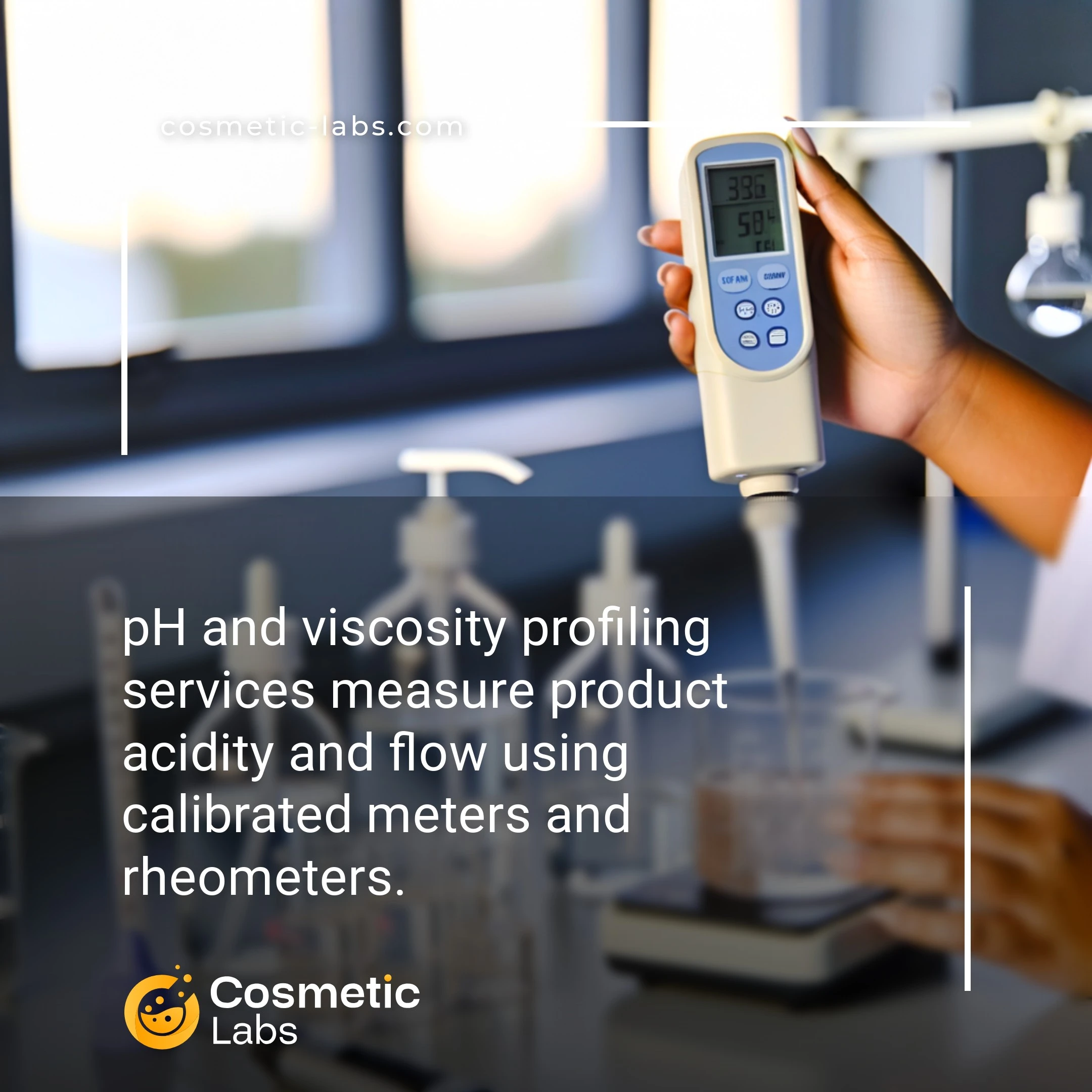pH and Viscosity Profiling Services for Cosmetic Product Development

What is pH and viscosity profiling?
pH and viscosity profiling services measure how your formulation’s acidity and thickness change over time, temperature ranges, and storage conditions. Our partner labs test samples at 2-week intervals across 6-12 months, tracking pH shifts that affect preservative efficacy and viscosity changes that impact product texture and dispensing. Most stability failures stem from pH drift below 4.5 or above 7.5, making these profiles your early warning system.
Why do you need this service?
Cosmetic labs use pH and viscosity profiling to optimize product stability and shelf life during formulation development. These measurements help formulators adjust preservative systems for maximum effectiveness at specific pH levels while ensuring the final texture meets consumer expectations—whether that’s a lightweight serum at 15 cP or a rich cream at 50,000 cP. Labs apply this data to prevent separation, crystallization, and microbial growth before products reach market.
Who provides pH and viscosity profiling services?
All cosmetic labs providing pH and viscosity profiling services
There is no company providing these services at the moment.
pH and Viscosity Testing for Cosmetic Products
Cosmetic labs offer pH and viscosity profiling services to verify your formulations meet quality standards and perform as intended. These measurements directly impact product stability, skin compatibility, and user experience—making them non-negotiable steps in preclinical characterization.
pH Testing Methods and Applications
Labs test pH levels across your entire product line using calibrated meters and specialized probes designed for different textures. Standard pH ranges vary by product type:
- Facial cleansers: 4.5-7.0
- Toners and serums: 4.0-6.0
- Moisturizers: 5.0-7.0
- Hair products: 4.5-6.5
Testing includes stability checks at different temperatures and time points. Labs document pH shifts during shelf-life studies to predict how your products will perform over months or years of storage.
Viscosity Profiling Techniques
Viscosity measurements determine flow properties and texture consistency using rheometers and viscometers. Labs analyze how your formulas behave under different conditions—from rest to application.
Key viscosity parameters include:
- Flow curves at varying shear rates
- Yield stress for gel-based products
- Temperature-dependent viscosity changes
- Thixotropic behavior assessment
These profiles help predict pump dispensing, spreadability, and whether products will maintain their texture during shipping. Labs provide detailed reports with viscosity curves and recommendations for formula adjustments when needed.
Real-World Applications of pH and Viscosity Testing in Cosmetic Development
pH and viscosity measurements directly impact product performance, stability, and consumer satisfaction across every cosmetic category.
Formulation Development and Optimization
Labs use pH and viscosity profiling services to perfect textures and ensure skin compatibility during early development stages. pH testing between 4.5-7.0 helps formulators match products to skin’s natural acid mantle, while viscosity measurements guide texture adjustments for serums (500-5,000 cP), lotions (10,000-50,000 cP), and creams (50,000-200,000 cP).
Real-time viscosity monitoring during production reveals how ingredients interact under different temperatures and mixing speeds. This data prevents separation issues and ensures consistent batch quality.
| Product Type | Target pH Range | Typical Viscosity (cP) | Key Testing Points |
|---|---|---|---|
| Face Serums | 5.0-6.5 | 500-5,000 | Initial blend, after actives, final product |
| Body Lotions | 5.5-7.0 | 10,000-50,000 | Emulsification, cooling phase, 24hr stability |
| Eye Creams | 6.0-7.5 | 80,000-150,000 | Pre/post homogenization, packaging stage |
| Cleansers | 4.5-6.0 | 2,000-20,000 | Surfactant addition, thickening phase, final QC |
Stability Testing and Shelf Life Prediction
Temperature cycling tests track pH and viscosity changes to predict product lifespan and identify formulation weaknesses. Labs monitor these parameters at 4°C, 25°C, and 40°C over 3-6 month periods, documenting shifts that signal ingredient incompatibilities or preservative failures.
Rheological analysis reveals flow behavior changes that affect product dispensing and application. Shear-thinning measurements help optimize pump bottles and airless containers, while yield stress data ensures creams won’t leak from jars during shipping.
Ready to validate your formulation’s pH and viscosity profile? Connect with specialized cosmetic labs on our platform for professional testing services tailored to your product requirements.
